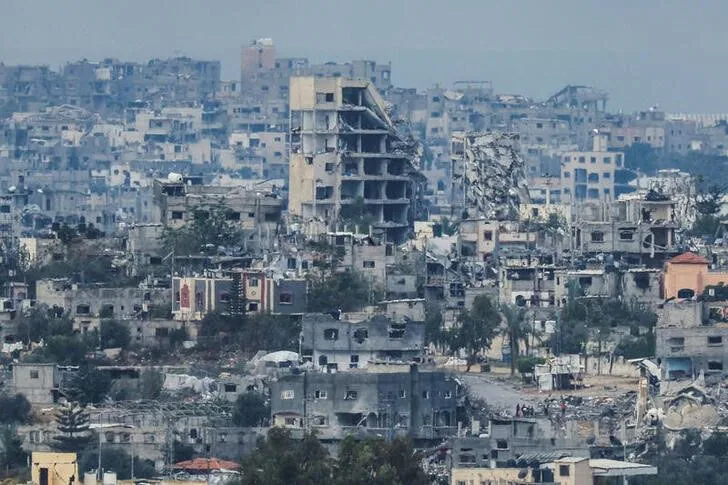
Israeli forces and Hamas fighters held their fire beyond the original deadline of a truce on Tuesday, extended at the last minute by at least two days to let more hostages go free.
With both sides expressing hope of further extensions, mediator Qatar hosted the spy chiefs from Israel’s Mossad and the US CIA at a meeting to “build on progress”, a source briefed on the visits said.
A single column of black smoke could be seen rising above the obliterated wasteland of the northern Gaza war zone from across the fence in Israel, but for a fifth day there was no sign of jets in the sky or rumble of explosions.
Both sides reported some Israeli tank fire in the Sheikh Radwan district of Gaza City in the morning, but there were no reports of casualties. Israel said its troops had been approached and fired a warning shot.
Previously during the truce, Hamas fighters released 50 Israeli women and children, some of them toddlers, from among the 240 hostages they captured in southern Israel during a deadly rampage on October 7. In return, Israel released 150 security detainees from its jails, all women and teenagers.
Hamas also released 19 foreign hostages, mainly Thai farmworkers, under separate deals parallel to the truce agreement.
Israel has said the truce could be prolonged as long as Hamas continues to release at least 10 hostages per day. But with fewer women and children left in captivity, keeping the guns quiet beyond Wednesday could require negotiating to free at least some Israeli men for the first time.
“We hope the occupation (Israel) abides (by the agreement) in the next two days because we are seeking a new agreement, besides women and children, whereby other categories that we have that we can swap,” Hamas official Khalil Al-Hayya told Al Jazeera late on Monday.
Israeli security cabinet minister Gideon Saar told Army Radio that the two-day extension had been agreed under the terms of the original offer, and Israel remained willing to extend the truce further if more hostages were released.
“Immediately upon the completion of the hostage-recovery framework, the warfighting will be renewed,” he said.
Qatar’s foreign ministry said it was now trying to secure a further extension based on Hamas releasing more hostages. The truce brought the first respite to the Gaza Strip in seven weeks, during which Israel had bombed swathes of the territory into a desolate moonscape.
Many Gazans used the opportunity to return to abandoned or destroyed homes, like Abu Shamaleh, who was picking through the rubble of his flattened home in Khan Younis, looking for anything recoverable in the masonry. He said 37 family members had been killed.
“Today I have nothing in this world but memories. Everything is gone,” he said. There was no machinery to excavate the body of a cousin still buried in the ruins, he said. “The truce is the time to lift the rubble and search for all the missing people and bury them. We honour the dead by burying them.”
Among Israeli hostages yet to be freed was ten-month-old baby Kfir Bibas, along with his brother Ariel, 4, and their parents Yarden and Shiri, bundled from a kibbutz by gunmen on October 7. Yarden’s sister told reporters relatives had learned the family would not be in the group to go free on Tuesday. Israeli officials said they believed they were being held by a militant group other than Hamas.
“Kfir is only 10 months old. He is a child who still doesn’t even know how to say ‘Mommy’,” Jimmy Miller, a cousin, told Channel 12 TV. “We in the family are not managing to function… The family hasn’t slept for a long, long time already – 51 days.”
Israel has sworn to annihilate Hamas, the militant group that rules Gaza, after its gunmen burst across the fence and went on a violent spree, killing around 1,200 people and seizing 240 captives.
Since then, Gaza health authorities deemed reliable by the United Nations say more than 15,000 people have been confirmed killed in Israel’s bombardment, around 40 per cent of them children, with many more dead feared to be lost under rubble.
More than two-thirds of Gaza’s 2.3 million people have lost their homes, with thousands of families sleeping rough in makeshift shelters with only the belongings they could carry. When the war resumes, Israel has made clear it intends to press on with its assault from the northern half of Gaza into the south. US officials said they have told their ally to be more careful protecting civilians as its forces press on.
“You cannot have the sort of scale of displacement that took place in the north replicated in the south. It will be beyond disruptive, it will be beyond the capacity of any humanitarian support network,” one US official said in a call with reporters. “It can’t happen.”
Despite releasing 150 detainees under the truce, Israel has been arresting Palestinians far faster than it lets them go: according to the Palestinian Prisoners’ Club, a semi-official organisation, 3,290 Palestinians have been detained since October 7.
Israel added an additional 50 Palestinian women to its list of 300 detainees cleared for release under the truce, seen as a sign it was prepared to negotiate for more hostages to go free under further extensions.
Israel’s siege has led to the collapse of Gaza’s healthcare system, especially in the northern half of the territory where no hospitals remain functioning. The World Health Organization said more Gazans could soon be dying of disease than from bombing.
There were already a very high number of cases of infants suffering from diarrhoea, said WHO spokesperson Margaret Harris: “No medicines, no vaccination activities, no access to safe water and hygiene and no food.”
- A Reuters report











